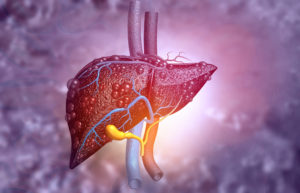
Dr. Lisa VanWagner of Northwestern University Feinberg School of Medicine in Chicago led the study, which followed fatty liver patients over five years. She said, “It’s critical to both your liver health and your heart health to maintain a healthy weight.”
The study followed 159 people with NAFLD and 1,668 people without the condition for over five years. Participants with NAFLD had an average body mass index (BMI) of 36, meaning they were obese. Those without NAFLD had an average BMI of 29.6, which is still considered overweight, but a few pounds away from being obese.
It was found that those with fatty liver disease were more likely to have risk factors for heart failure such as high blood pressure and diabetes than those without NAFLD.
Researchers accounted for other heart failure risks and found no difference in the findings. Once they also factored in weight, there was evidence that this was what linked fatty liver disease to heart failure.
“We already knew that fatty liver disease is connected with the presence of damage in the heart structure and function,” said Dimitrios Koutoukidis, a researcher at the University of Oxford in the UK who wasn’t involved in the study.
“This study tells us that fatty liver disease is linked to the development and worsening of such damage in the heart over 5 years, and that this link was mostly due to the higher levels of obesity in people with fatty liver disease.”
Small Amount of Fat in the Liver
On average, most people have small amounts of fat in their liver. Those with fatty liver disease are diagnosed when the total of fat in the liver is above 5%. If the condition is not linked to liver damage from heavy drinking, it is known as Non-alcoholic fatty liver disease (NAFLD) and is often connected with obesity and poor eating habits.
The study conclusion published in the Journal of the American Heart Association noted that it is possible for inflammation and high blood sugar to contribute to fatty liver disease and heart failure. These conditions are more prevalent in people with obesity.
“Even a small amount of weight loss can also help people with fatty liver disease and overweight improve their liver and reduce their risk for heart disease,” Koutoukidis said.
Everyone can benefit from a low-calorie healthy diet that includes a variety of fruits and vegetables. Physical activity is also extremely important for the management of weight and can go a long way in helping to reduce the risk of many health problems.